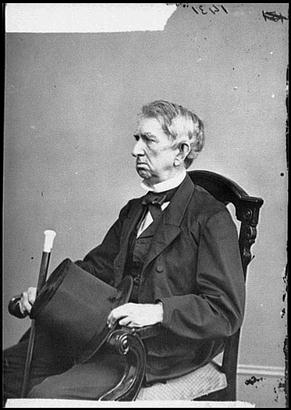

I deem it established . . . that the Constitution does not recognize property in man, but leaves that question, as between the states, to the law of nature and of nations. That law . . . is founded on the reason of things. . . . The right to have a slave implies the right in some one to make the slave; that right must be equal and mutual, and this would resolve society into a state of perpetual war. But if we grant the original equality of the states, and grant also the constitutional recognition as slaves as property, still the argument we are considering fails. Because the states are not parties to the Constitution as states; it is the Constitution of the people of the United States. . . .
But there is a higher law than the Constitution, which regulates our authority over the domain, and devotes it to the same noble purposes. The territory is a part, no inconsiderable part, of the common heritage of mankind, bestowed upon them by the Creator of the universe. We are his stewards, and must so discharge our trust as to secure in the highest attainable degree their happiness. . . .
And now the simple, bold, and even awful question which presents itself to us is this: Shall we, who are founding institutions, social and political, for countless millions; shall we, who know by experience the wise and the just, and are free to choose them, and to reject the erroneous and the unjust; shall we establish human bondage, or permit it by our sufferance to be established? Sir, our forefathers would not have hesitated an hour. They found slavery existing here, and they left it only because they could not remove it. There is not only no free state which would now establish it, but there is no slave state, which, if it had had the free alternative as we now have, would have founded slavery. Indeed, our revolutionary predecessors had precisely the same question before them in establishing an organic law under which the states of Ohio, Indiana, Michigan, Illinois, and Wisconsin, have since come into the Union, and they solemnly repudiated and excluded slavery from those states forever. I confess that the most alarming evidence of our degeneracy which has yet been given is found in the fact that we even debate such a question. . . .
Slavery has a reliable and accommodating ally in a party in the free states, which, though it claims to be, and doubtless is in many respects, a party of progress, finds its sole security for its political power in the support and aid of slavery in the slave states. . . . Slavery has, moreover, a more natural alliance with the aristocracy of the north and with the aristocracy of Europe. So long as slavery shall possess the cotton-fields, the sugar-fields, and the rice-fields of the world, so long will commerce and capital yield it toleration and sympathy. . . . Slavery has a guaranty still stronger than these in the prejudices of caste and color, which induce even large majorities in all the free states to regard sympathy with the slave as an act of unmanly humiliation and self-abasement, although philosophy meekly expresses her distrust of the asserted natural superiority of the white race, and confidently denies that such a superiority, if justly claimed, could give a title to oppression. . . .
I would not rashly provoke the trial; but I will not suffer a fear, which I have not, to make me compromise one sentiment, one principle of truth or justice, to avert a danger that all experience teaches me is purely chimerical. Let, then, those who distrust the Union make compromises to save it. I shall not impeach their wisdom, as I certainly cannot their patriotism; but, indulging no such apprehensions myself, I shall vote for the admission of California directly, without conditions, without qualifications, and without compromise
To return to the HIS 103 Documents page, please click here.
To return to the main webpage, please click here.